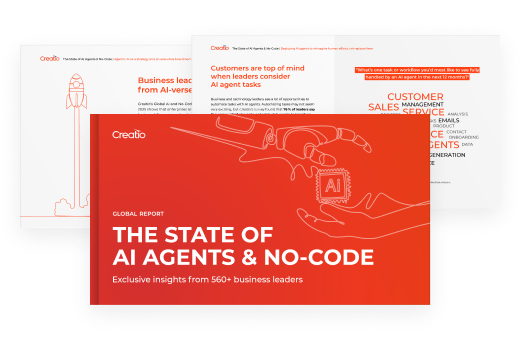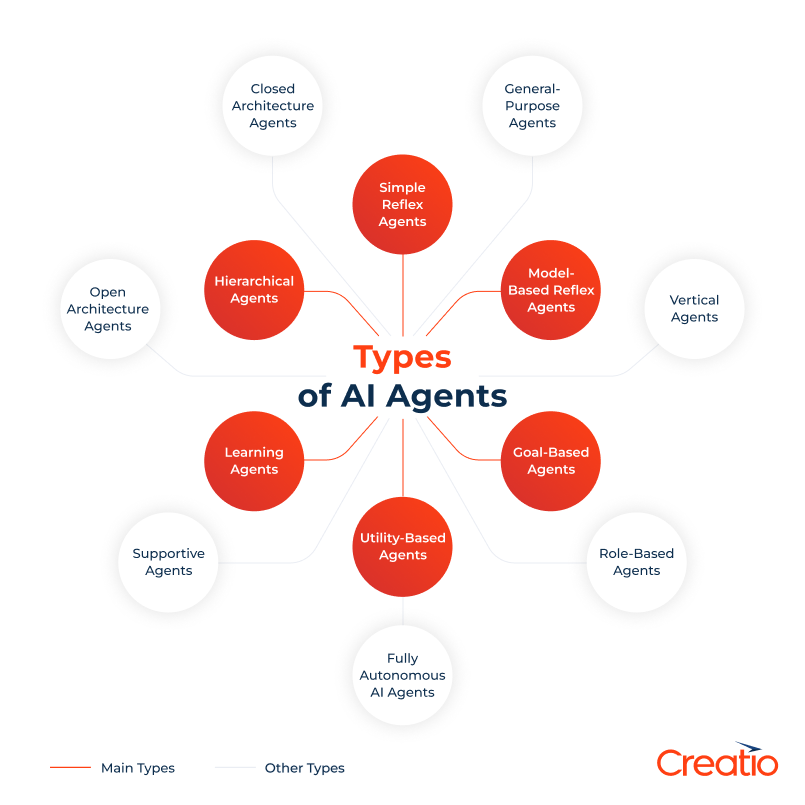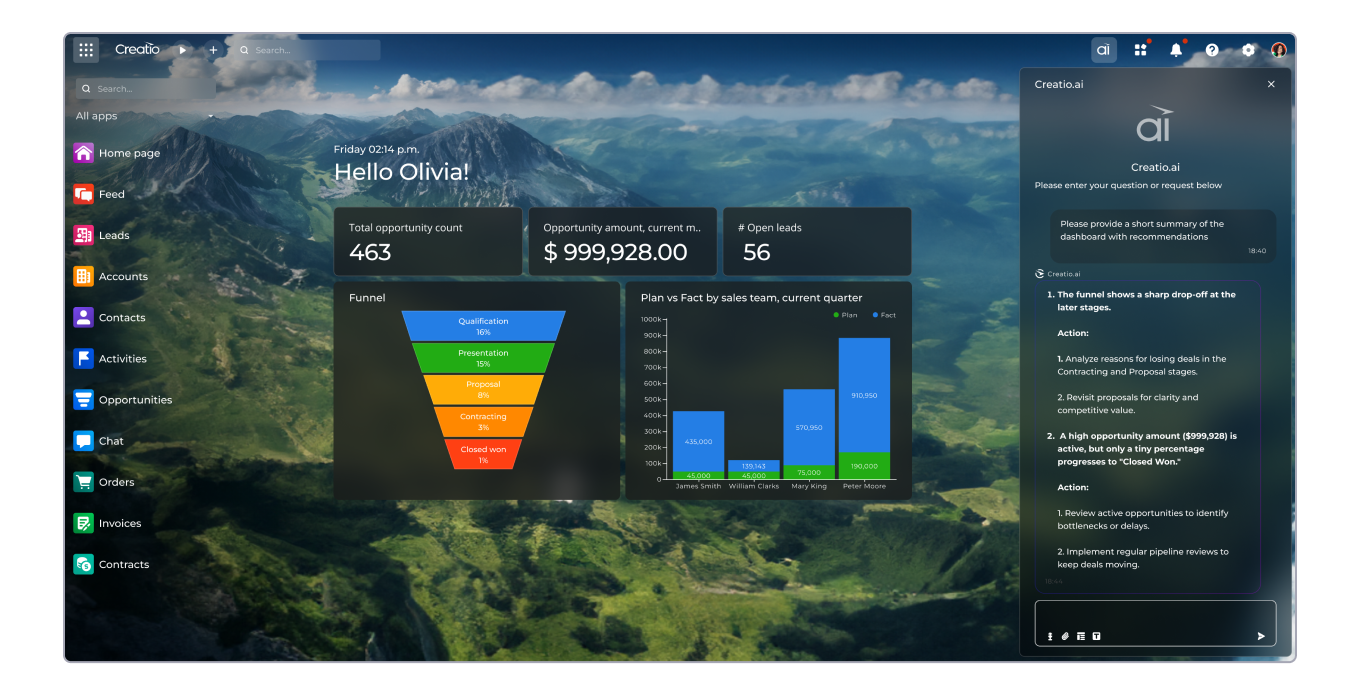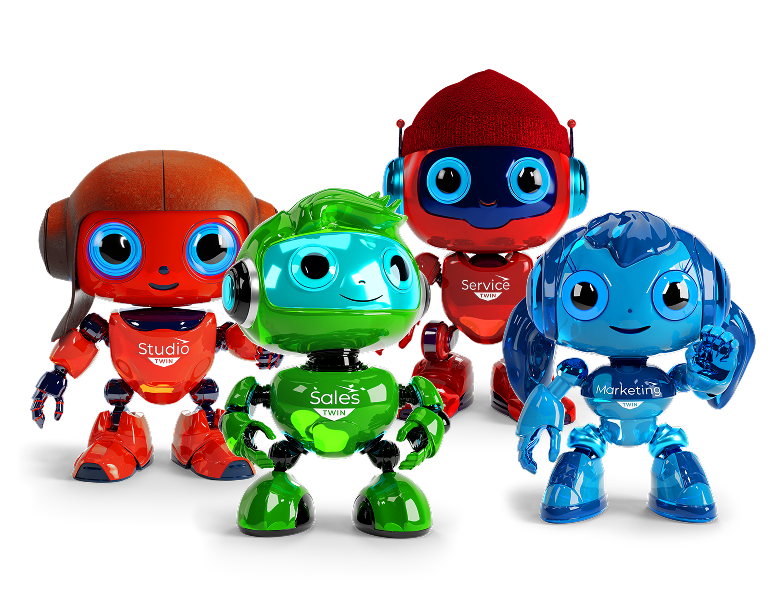-
No-Code
Platform
-
Studio
No-code agentic platform delivering the fastest time-to-value and the highest ROI
-
Studio
-
AI-Native CRM
CRM
-
AI-Native CRM
New era CRM to manage customer & operational workflows
CRM Products -
AI-Native CRM
- Industries
- Customers
- Partners
- About
AI Agents Examples: Real-World Examples Across Functions and Industries
Updated on
October 01, 2025
13 min read
Create AI Agents for Your Unique Workflows with Creatio

The increasing presence of AI agents across industries is changing how businesses operate and engage with their customers. As artificial intelligence agents become more prevalent, they are proving to be indispensable tools for enhancing efficiency, supporting decision-making, and providing personalized experiences.
In this article, we will explore various AI agents examples and across sectors such as sales, customer service, pharma, finance, and beyond.
What are AI Agents?
AI agents are software systems that can sense their environment, make decisions, and take actions to accomplish tasks on behalf of users. They also continuously reflect and learn from the outcomes and user feedback to become more effective and accurate over time.
Unlike traditional software that follow predefined rules, AI agents use advanced artificial intelligence technology, such as machine learning (ML), large language models (LLM), and natural language processing (NLP) to act autonomously and adapt their behavior in real time.
Learn more about AI agents and how they work.
The State of AI Agents & No-Code
Learn how 560+ leaders across the world use AI and no-code to drive innovation today

Types of AI Agents
You might be familiar with a few types of AI agents, each designed to fulfill different objectives, from simple reflex agents that automate repetitive tasks to complex hierarchical multi-agent systems that orchestrate entire business processes. In this section, we’ll define the key characteristics of these main agent types and explore other AI agents based on the breadth of their expertise, integration with external tools, and level of autonomy.

Main types of AI agents
- Simple reflex agents are a basic type of AI agents designed to follow a set of predefined rules to fulfill simple, repetitive tasks. These rule-based agents don't consider past experiences or future consequences and can't adapt to new situations.
- Model-based reflex agents create an internal model of the environment to make autonomous decisions based on the current state of the environment, past experiences, and probable outcomes.
- Goal-based agents are designed to fulfill specific goals by evaluating different paths and choosing the best one to achieve desired outcomes. They don't need predefined rules or detailed instructions to work effectively.
- Utility-based agents not only fulfill goals but find a way to achieve the best results by considering factors, such as efficiency, costs, risks, etc. These agents are best equipped to assist in complex decision-making processes.
- Learning agents are advanced AI agents that can analyze past experiences and feedback to learn, adapt, and improve performance over time, helping businesses optimize their processes.
- Hierarchical agents consist of multiple agents organized in layers to perform complex tasks and orchestrate end-to-end business processes.
Other types of AI agents
- General-purpose agents are flexible AI agents designed to handle diverse tasks through multiple capabilities. They are generally more complex to build and may sacrifice the depth of knowledge and expertise for breadth.
- Vertical agents are trained on industry-specific data to perform tasks, provide insights, and support decision-making within one field, such as manufacturing, pharma, etc.
- Role-based agents are designed to fulfil one specific function, such as lead scoring, customer onboarding, etc. They are easier to design and test, but their functionality scope is limited.
- Fully autonomous AI agents make decisions without needing human intervention, which makes them highly efficient and scalable. However, they require strong governance and security measures to ensure they work as intended.
- Supportive agents support humans in making decisions by analyzing data and providing recommendations but require oversight at critical decision points. They work through the human-in-the loop approach, which ensures better safety and compliance, crucial for high-stakes industries, like finance and healthcare.
- Open architecture agents can access external tools, APIs, knowledge sources, and third-party databases to expand their functionality. However, they may pose security risks and integration challenges.
- Closed architecture agents operate in a closed, controlled environment, enhancing security and reliability but sacrificing flexibility and limiting their capabilities.
AI Agents Examples Across Departments and Industries
In this section, we will focus on real-world examples of role-based AI agents for various functions within sales, marketing, and customer service teams. We will also provide examples for different industries, such as finance, pharma, manufacturing, and more.
Sales AI agents
AI sales agents automate and optimize various aspects of the sales process, from lead generation and nurturing to closing deals. These intelligent agents help sales teams increase efficiency, enhance customer engagement, and drive revenue growth.
Here are a few AI agents examples for sales teams:
- Lead generation agent - identifies and qualifies potential leads based on their demographic, behavior, and engagement level to help businesses target the right prospects that fit the ideal customer profile.
- Sales outreach agent - automates outreach efforts and personalizes sales communication to engage prospects and customers at scale.
- Account research agent - enriches data with account insights derived from external sources.
- Meeting agent - prepares personalized agendas, talking points, product recommendations, and content to help sales representatives prepare for meetings more efficiently.
- Quote generation agent - streamlines quote creation with AI-assisted pricing and recommendations.
- Sales chatbot - AI-powered chatbot engages with potential customers in natural language 24/7 on websites, messaging apps, or social media platforms, answering typical questions, scheduling demos, and providing product recommendations.
- Sales forecasting agent - analyzes large volumes of historical and real-time sales data to provide insights on future sales opportunities, market trends, customer behavior, and potential risks.
Marketing AI agents
AI agents in marketing automate campaign execution, optimize performance, and scale content creation. These agents can help marketing teams improve customer targeting, personalize content, and enhance campaign effectiveness.
Here's a breakdown of different AI agents examples in marketing:
- Segmentation agent - analyzes customer data, such as demographic and firmographic data, purchasing patterns, online activity, etc., to identify distinct customer segments for targeted campaigns.
- Marketing content agent - helps generate ready-to-use templates and content drafts for emails, product recommendations, ads, articles, etc.
- Email generation agent - boosts the effectiveness of bulk emails with tailored messaging, automated scheduling, and A/B testing.
- Ad campaign management agent - automates digital ad campaigns across multiple platforms, continuously monitors campaigns’ performance, and optimizes campaigns in real-time by adjusting bidding, reallocating budgets, and identifying high-performing ad creatives.
- Social media agent - monitors social media channels for brand mentions, analyzes online sentiment, and responds to customer queries.
- Lead conversion agent - engages with leads through personalized content, prioritizes and distributes leads to maximize conversion rates.
- Shopping assistant - provides personalized product recommendations based on customer data, past purchases, browsing patterns, and online behavior.
Customer Service AI agents
AI agents in customer service help businesses provide 24/7 support and improve case resolution times. From answering common customer queries to supporting customer service representatives, these AI agents handle various tasks that enhance the overall customer experience.
Here are a few examples of AI agents for customer service:
- AI Chatbots - offer customer support in natural language 24/7, answering typical inquiries, troubleshooting basic issues, performing simple tasks, and automatically escalating more complex cases to customer service representatives.
- Voice agent - handles customer service phone calls by recognizing speech, understanding intent, and giving verbal responses. It can answer customer questions, process requests, and redirect clients to the right department.
- Virtual assistants - AI-powered assistants provide support to customer service representatives by surfacing crucial information, providing case summaries, and recommending tailored solutions.
- Ticketing agent - automatically categorizes, prioritizes, and routes customer support tickets based on urgency, complexity, and customer service representatives' expertise.
- Sentiment agent - analyzes and summarizes sentiment of customer interactions from chat logs, call transcripts, social media posts, and customer feedback to determine whether customers are satisfied, frustrated, or upset.
- Knowledge base agent - helps generate and update support articles, making it easier to maintain an accurate and up-to-date knowledge base.
Finance AI agents
Role-based AI agents in the financial industry are transforming how financial institutions interact with customers, manage risks, and optimize operations. They help finserv businesses make smarter decisions, detect risks early, and provide personalized financial advice to their clients.
Here’s an overview of different types of role-based AI agents in the financial industry:
- Fraud detection agent - monitors and analyzes transaction data in real time to detect fraudulent activities. This agent can identify anomalies, block suspicious transactions, and alert the security team about potential fraud, helping financial institutions enhance security and compliance with Anti-Money Laundering (AML) regulations.
- Investment agent - provides personalized investment recommendations tailored to customer goals, risk tolerance, and market conditions.
- Credit scoring agent - evaluates creditworthiness and potential risks by analyzing customers’ credit history, spending behavior, income, and even social media activity to provide more accurate credit scores.
- Trading agent - automates trading by autonomously executing trades based on market conditions and predefined criteria. It helps reduce costs and improve marketing efficiency by making data-driven decisions about how and when to sell or buy assets.
- Onboarding agent - automate the collection and verification of customer data, such as personal details, financial history, and identification documents, to streamline the onboarding process for new customers. Onboarding AI agents can also guide customers through onboarding, providing personalized experiences.
- Debt collection agent - automatically sends notifications to customers to remind them about payment deadlines, tailors collection strategies to customer preferences, and improves collection rates.
Insurance AI agents
AI agents help insurance companies process claims more effectively, provide personalized advice, make more informed decisions, and enhance risk assessment. By using role-based agents built for the insurance industry, insurers can improve their operational efficiency and increase customer satisfaction.
Below you’ll find a few AI agents examples in insurance:
- Claim processing agent - automates the review and evaluation of insurance claims by analyzing submitted documents and photos, assessing damages, and recommending whether a claim should be approved, denied, or further investigated. Using AI agents, insurance companies can streamline claim processing, reduce resolution time, and increase customer satisfaction.
- Underwriting agent - supports underwriting decisions by analyzing client demographic information, behavior, historical data, and external factors, such as weather conditions, to assess risks effectively. An AI agent ensures faster decision-making and reduces human bias and errors.
- Insurance advisor agent - recommends personalized insurance policies by analyzing customers' lifestyle, risk tolerance, past insurance history, and specific needs.
- Customer support agent - answers routine customer questions regarding policy details, coverage options, and claim status. It can also assist customers in filing claims and renewing policies, reducing the workload of human agents.
- Coverage calculating agent - automatically calculates compensation based on submitted documents and issues payouts, streamlining the settlement process and increasing customer satisfaction.
- Fraud detection agent - increases insurance companies' ability to detect fraudulent claims and reduces financial losses. An AI agent can identify inconsistencies more efficiently than human agents by analyzing patterns in claim data, customer behavior, and external information using advanced algorithms.
- Risk-predicting agent - analyzes market trends, external conditions, economic fluctuations, and historical data in rea -time to predict future risks and losses. By continuously adapting to new information and changing conditions, this AI agent helps insurance companies prepare for potential risks, optimize pricing, and effectively allocate resources.
Pharma AI agents
AI can quickly analyze large volumes of data and discover patterns that human researchers might have missed. Intelligent agents designed for the pharmaceutical industry are trained on medical data and specialize in medical research, which makes them extremely valuable in drug discovery, clinical trials, and pharmacovigilance.
Here are some examples of AI agents in pharma:
- Drug discovery agent - analyzes chemical and biological data to identify potential drug candidates, predict the interaction between molecules, and suggest new compounds that could have therapeutic effects. By automating the initial stages of drug discovery, AI accelerates the process, reduces costs, and helps uncover new treatments.
- Clinical trial agent - analyzes patient data to find eligible candidates for clinical trials based on their medical history and current health, improving patient recruitment efficiency.
- Pharmacovigilance agent - monitors the safety of drugs after they have been released to the market by analyzing patient reports, clinical data, and post-market surveillance. This agent can identify adverse drug reactions (ADRs), predict potential safety risks, and help pharmaceutical companies comply with regulatory requirements.
- Drug manufacturing agent - tracks production metrics in real time, predicts potential production issues, and ensures that drugs are manufactured with the highest quality standards.
- Supply chain management agent - ensures that raw materials, intermediates, and finished products are delivered on time and in the right quantities. It can also predict potential disruptions in the supply chain and suggest proactive measures to mitigate shortages or delays.
- Compliance agent - helps pharmaceutical companies navigate complex regulations, monitor compliance, and prepare documents for FDA/EMA approval.
Manufacturing AI agents
AI agents for manufacturing companies are designed to ensure production processes run smoothly by predicting maintenance needs, optimizing production scheduling, and managing supply chains.
Examples of AI agents in manufacturing include:
- Predictive maintenance agent - monitors machinery and equipment in real-time to predict when they might fail before it actually happens. This allows manufacturers to schedule maintenance exactly when needed, reduce downtime, and increase machinery lifespan.
- Maintenance documentation agent - automatically creates detailed maintenance reports to ensure that all maintenance activities, repairs, and inspections are correctly logged and documented.
- Quality control agent - uses computer vision, machine learning, and image recognition to monitor products on the production line, detecting defects in real time. This AI agent helps manufacturers maintain high-quality standards and reduce errors in the inspection process.
- Production optimization agent - focuses on improving the efficiency and effectiveness of manufacturing processes by analyzing production data, identifying inefficiencies, and recommending adjustments.
- Supply chain agent - designed to manage inventory, predict demand, and streamline the procurement of raw materials.
- Production scheduling agent - helps create optimal production schedules by analyzing current demand, machine availability, workforce capacity, material stock levels, etc. It can also adjust the schedules to address supply delays, labor shortages, and equipment breakdowns.
Transportation AI agents
Role-based AI agents in the transportation industry optimize logistics, improve safety, and enhance overall operational efficiency.
Below are a few examples of different role-based AI agents for transportation industry:
- Route optimization agent - finds the most efficient routes, minimizing travel time, fuel consumption, and costs. By analyzing real-time data, such as traffic conditions, weather forecasts, and road closures, it can determine the best possible routes and adjust them to new information.
- Fleet management agent - designed to help increase fleet performance, this AI agent analyzes GPS tracking data, vehicle diagnostics, and driver schedules to recommend improvements.
- Cargo and freight tracking agent - monitor the location and status of shipments, providing customers and logistics companies with real-time updates. It tracks the movement of goods by analyzing data from GPS, IoT devices, and supply chain management systems.
- Autonomous vehicle agent - this type of AI agent is at the forefront of transforming transportation, powering self-driving cars. This agent analyzes data from vehicle sensors to navigate roads, detect obstacles, and make decisions.
- Traffic management agent - used by city planners and transportation authorities to optimize traffic flow and reduce congestion in urban areas. By analyzing data from traffic cameras, sensors, and GPS devices, this AI agent can help adjust traffic lights and manage road usage.
- Customer service agent - answers common customer questions regarding flight status, train schedule, baggage policies, and other travel-related inquiries. It can also help passengers perform simple tasks like booking tickets, changing passengers’ information, cancelling tickets, etc.
Other agents examples
- Dynamic pricing agents - dynamically adjust prices based on market conditions, demand, competition, etc. These AI agents can change prices in real time and are commonly used on flight, hotel, and taxi booking websites and applications.
- Content recommendation agents - provide personalized content recommendations based on user data and behavior. Used by streaming platforms, such as Netflix, HBO, and Spotify, to suggest similar content.
- Project management agents - schedule and distribute tasks, allocate resources, set deadlines, and send reminders to ensure the team is on track.
- Coding agents - assist developers by writing lines of code, debugging, and testing. Based on developer input, these agents can suggest code snippets or even generate full functions and classes, significantly speeding up the coding process.
- Document management agents - automatically organize, retrieve, and process business documents. They can categorize documents based on their content, extract data from invoices, contracts, and forms, and input data into systems or workflows.
- Data management agents - automatically update and organize data across various platforms, such as CRMs, ERPs, accounting software, and other business tools.
Creatio’s Role-Based AI Agents
Creatio offers role-based AI agents for customer-facing teams as a core part of its AI-native platform. These intelligent agents are designed to automate and optimize key sales, marketing, and customer service tasks, helping organizations streamline workflows, enhance decision-making, and improve customer engagement. Additionally, Creatio offers agents tailored to the needs of the financial industry, helping banks, credit unions, and other financial organizations optimize their operations. Creatio's AI agents empower teams with intelligent, data-driven insights and automation tools, transforming how businesses interact with customers and manage internal processes. 
Creatio's AI agents work alongside business users to unleash the full potential of human and digital talent working together in harmony. By adopting AI agents, businesses can empower employees to increase productivity, focus on creativity, and deliver unprecedented results.
Here are a few examples of Creatio’s role-based AI agents:
- Sales agents: Account Research Agent, Quote Generation Agent, and Meeting Preparation Agent help sales teams automate preparation, personalize outreach, and close deals faster.
- Marketing Agents: Lead Conversion Agent, Marketing Content Agent, and Email Generation Agent enable marketing teams to scale content creation and campaign execution while ensuring personalized approach.
- Service Agents: Customer Support Agent and Knowledge Base Agent help customer service teams deliver faster, more accurate resolutions.
- Finserv Agents: Client Onboarding Agent, Account Opening Agent, Loan Origination and Credit Scoring Agent, and Compliance and Risk Management Agent empowers financial organizations to personalize customer experiences and enhance operations’ security.
Creatio's role-based AI agents are embedded directly into productivity tools, such as MS Teams and Outlook, helping users with daily tasks and surfacing important information. While AI agents automate routine tasks and provide contextual insights, employees can focus on interacting with customers and strategic work. Additionally, Creatio includes access to a No-Code Agent Builder that enables business users to create new agents by visually composing skills, workflows, and knowledge. By combining no-code tools with AI capabilities, even non-technical users can create their own digital teammates tailored to their unique needs.






















































